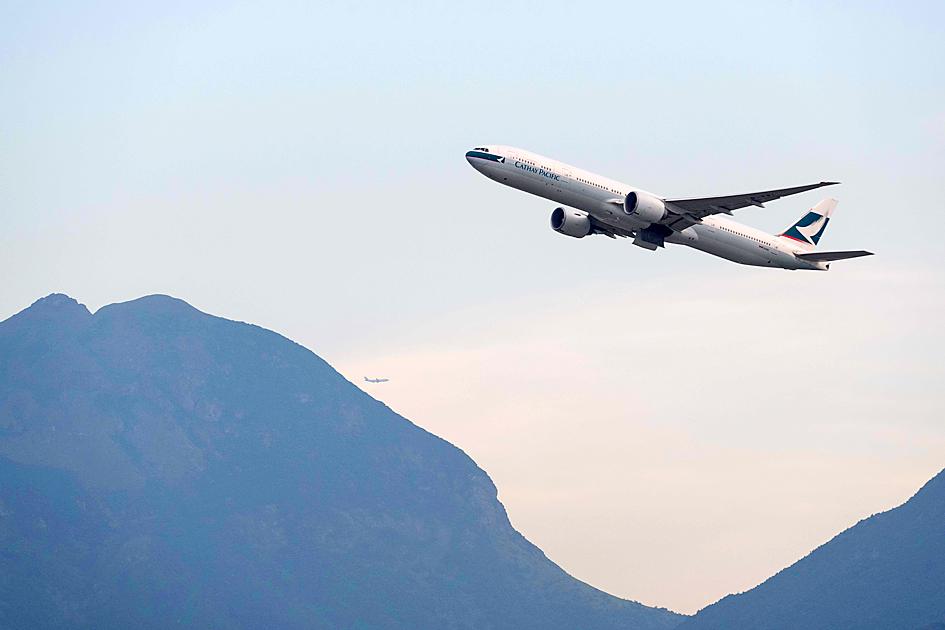Cathay Pacific Airways Ltd (國泰航空) is still burning through as much as HK$2 billion (US$258 million) a month and would continue to do so until the market recovers from the COVID-19 pandemic, the company said yesterday as it reported dismal traffic figures for last month and reiterated the need to restructure.
“We are weathering the storm for now, but the fact remains that we simply will not survive unless we adapt our airlines for the new travel market,” chief customer and commercial officer Ronald Lam (林紹波) said in a statement.
“A restructuring will therefore be inevitable to protect the company, the Hong Kong aviation hub, and the livelihoods of as many people as possible,” Lam said.

Photo: AFP
A HK$39 billion recapitalization plan completed last month bought the company some time, but “it is an investment that we need to repay,” he said.
Cathay, which last month reported a net loss of HK$9.9 billion for the first half of this year, is undergoing a strategic review. Recommendations about the shape and size of the airline, which includes Cathay Dragon (國泰港龍) and Hong Kong Express Airways Ltd (香港快運航空), are due to be presented to the board in the fourth quarter.
Cathay and Cathay Dragon flew only 35,773 passengers last month, a slump of 98.8 percent from the same period last year.
Revenue passenger kilometers fell 98.1 percent and passenger load factor dropped 60 percentage points to 19.9 percent, the company said yesterday.
The group carried 102,122 tonnes of cargo, down 36.7 percent from a year earlier.
“It is clear that we are facing a long and uncertain road to recovery,” Lam said.
With few signs of improvement, bar a pickup on some services thanks to student traffic to the UK and the lifting of a ban on transit flights from mainland China, Cathay has lowered its operating passenger flight capacity down to about 10 percent this month and next month.
“Passenger demand continued to be very weak as new waves of COVID-19 in our key markets dampened overall travel sentiment,” Lam said. “With no new destinations being resumed in August, we saw only minimal increase in passenger flight capacity.”
Separately yesterday, a Thailand court approved the restructuring of Thai Airways International PCL, which is billions of US dollars in debt and struggling to survive the COVID-19 tourism crash.
The kingdom, once a majority shareholder in Thai, in May reduced its stake and went to the insolvency court to resolve the airline’s debt — which totaled 332.2 billion baht (US$10.6 billion at the current exchange rate) by the end of June, local media reported.
“The problem that caused debtors’ financial situation is not from its business, but from the rapid change in aviation, particularly the impact from COVID-19,” Bangkok’s Central Bankruptcy Court said yesterday.
It approved Thai Airways’ request for a rehabilitation plan, which would see its debt and company organization restructured.
The airline said after the ruling that it would propose that plan by the end of the year.
Additional reporting by AFP

BYPASSING CHINA TARIFFS: In the first five months of this year, Foxconn sent US$4.4bn of iPhones to the US from India, compared with US$3.7bn in the whole of last year Nearly all the iPhones exported by Foxconn Technology Group (富士康科技集團) from India went to the US between March and last month, customs data showed, far above last year’s average of 50 percent and a clear sign of Apple Inc’s efforts to bypass high US tariffs imposed on China. The numbers, being reported by Reuters for the first time, show that Apple has realigned its India exports to almost exclusively serve the US market, when previously the devices were more widely distributed to nations including the Netherlands and the Czech Republic. During March to last month, Foxconn, known as Hon Hai Precision Industry

Taiwan Semiconductor Manufacturing Co (TSMC, 台積電) and the University of Tokyo (UTokyo) yesterday announced the launch of the TSMC-UTokyo Lab to promote advanced semiconductor research, education and talent development. The lab is TSMC’s first laboratory collaboration with a university outside Taiwan, the company said in a statement. The lab would leverage “the extensive knowledge, experience, and creativity” of both institutions, the company said. It is located in the Asano Section of UTokyo’s Hongo, Tokyo, campus and would be managed by UTokyo faculty, guided by directors from UTokyo and TSMC, the company said. TSMC began working with UTokyo in 2019, resulting in 21 research projects,

Ashton Hall’s morning routine involves dunking his head in iced Saratoga Spring Water. For the company that sells the bottled water — Hall’s brand of choice for drinking, brushing his teeth and submerging himself — that is fantastic news. “We’re so thankful to this incredible fitness influencer called Ashton Hall,” Saratoga owner Primo Brands Corp’s CEO Robbert Rietbroek said on an earnings call after Hall’s morning routine video went viral. “He really helped put our brand on the map.” Primo Brands, which was not affiliated with Hall when he made his video, is among the increasing number of companies benefiting from influencer

Quanta Computer Inc (廣達) chairman Barry Lam (林百里) yesterday expressed a downbeat view about the prospects of humanoid robots, given high manufacturing costs and a lack of target customers. Despite rising demand and high expectations for humanoid robots, high research-and-development costs and uncertain profitability remain major concerns, Lam told reporters following the company’s annual shareholders’ meeting in Taoyuan. “Since it seems a bit unworthy to use such high-cost robots to do household chores, I believe robots designed for specific purposes would be more valuable and present a better business opportunity,” Lam said Instead of investing in humanoid robots, Quanta has opted to invest